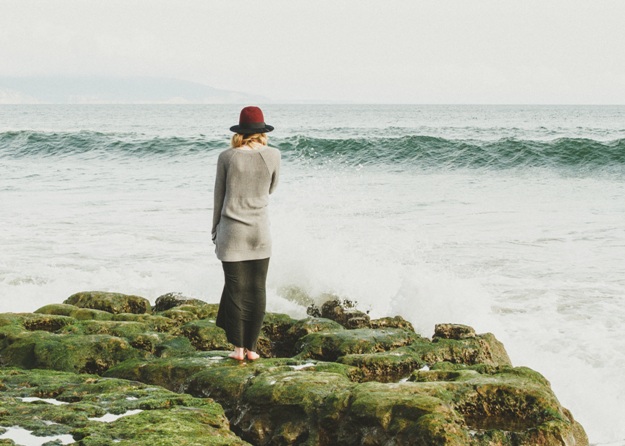A friend of mine had lap band surgery several years ago and was recently explaining to me how difficult the ensuing months and years were as he adjusted to a life without overeating.
“You go through a really intense period of grieving when you lose your ability to comfort yourself with food.”
“You mean you miss how enjoyable it was?” I asked.
“It’s way more than that,” he explained. “Losing your inability to overeat is like losing your best friend. It’s always there to comfort you and when you lose that, you are stuck with all the feelings you’ve been trying to cover up all those years.”
We all have things we depend on for comfort. Things that if lost would mean we would have to go inside and finally do the work that our “best friends” have been protecting us from doing.
We would have to get very vulnerable very quickly.
For some of us, it’s drugs and alcohol. For some of us it’s social media. For some of us, it’s food. All of these things provide our brains with a tiny serotonin kick every time we consume them—they make us feel good, if only in the moment.
Alcohol, Facebook, and food are not necessarily bad in and of themselves, as long as we have the ability to enjoy them in moderation. The issue arises when our need for comfort is too great for us to manage on our own—when our “best friend” becomes a crutch.
How do we manage when we can no longer handle the world by ourselves? What do we do when our best friend is no longer serving us?
How can we survive in this overwhelming world without these crutches to lean on?
At the end of the day, when our “best friends” leave us even more empty and anxious than when we started, all we have is ourselves.
Here are some ways to get by without help from your “best friends:”
1. Do the work to discover what it is you’re protecting yourself from feeling.
This is painful work and it’s work that lasts a lifetime. It’s not work that you do once and are done. It involves looking closely at your past and working with your deep, ancient wounds.
These wounds often originate in childhood where we learn ways to survive painful experiences and relationships in ways that save us at the time but don’t serve us and can even be harmful later on in life.
These experiences are a part of what has made you who you are today, for better and for worse.
Your work begins with making peace with your past and thanking your “best friend” for its service to you. It’s job was to protect you from pain that was too overwhelming and too all-encompassing to be experienced at the time.
So thank your best friend for protecting you when their protection was needed and necessary. Thank it for always having your best interest at heart.
Then let it know that its protection is no longer needed. And begin the work of releasing it.
This work usually requires the help of a trained counselor or therapist because our best friends are skilled at creating blind spots and supporting us as we stretch outside our comfort zone. These blind spots keep us dependent on them and prevent us from seeing what wounds are remaining hidden deep inside ourselves.
Counseling helps you navigate the dark passageways of your soul with love and self-empathy. It gives you a partner in your journey which gives you the gift of being fully seen and understood.
You can’t take away a source of comfort without replacing it with another source of comfort.
This new source of comfort needs to be one that serves you now in a healthy, fulfilling way. Replacing one source of comfort with another usually requires putting systems in place to support the change.
For example, if you’re in the habit of constantly checking social media—when you’re bored in the checkout line, when you’re overwhelmed at work, when you feel awkward in a social situation, cue yourself to your new habit by putting a picture of it on your phone’s wallpaper.
The reminder could simply be the word “breathe” to remind you to do some conscious breathing before opening your Pinterest app. It could be a picture of your kids to remind you to be in the present moment with them—even when it’s hard or annoying. It could be a picture that you feel represents you to remind you that you love yourself unconditionally including your imperfections.
Whatever you choose, make it easy to break your brain’s automatic association between your phone and that serotonin kick you get when you check it with a visual cue that stops the behavior before it starts.
Then replace the unhealthy behavior that really satisfies the need for comfort—for example, doing 30 seconds of conscious deep breathing, doing a yoga move or two, or allowing yourself to sit in silence and observing the feelings that come up for you when you don’t immediately numb them.
2. Create a healthier, more mature relationship with your “best friend.”
After I had my older daughter, I noticed that I was staying up late every night and then hating myself the next day. I couldn’t get out of the habit because I felt like it was my only chance to enjoy some alone time where I wasn’t taking care of another human being.
But I found that I was not using the time in a way that served me in any real way. I was watching TV, browsing Instagram, Googling random baby questions and then going down the ensuing wormhole.
I realized that my new “best friend,” staying up late, had my best interests in mind. It wanted me to survive the newborn stage without losing myself. For that I was grateful.
But our relationship needed to change because I was in a vicious cycle of exhaustion and self-righteous self care. I decided that I would use the reminder app on my phone to set alarms throughout the day that would trigger me to stop what I was doing and check in with myself.
I would ask myself what was really going on with me physically, emotionally, spiritually. Oftentimes, I would notice that I wasn’t meeting a basic need in that moment: my feet were cold but I wasn’t getting around to putting socks on, I was criticizing myself when I could have been treating myself with love and compassion.
When I was able to consciously address my needs in the moment, my need to stay up late when I was exhausted diminished on its own.
My “best friend” and I found a new way of being that worked better for both of us.
3. “The path to peace is peace.” ~ Buddha
This is one of my favorite quotes. It eloquently sums up the concept that if what we are looking for is peace (or comfort, safety, fulfillment, freedom) in our lives, that feeling is a journey, not a destination.
It is entirely within our power to access any feeling we desire to feel, regardless of our circumstances.
I find that when I remind myself of this truth, I feel empowered and am able to view a situation with a fresh new perspective.
There is no way you can reach your desired outcome of peace through a habit that doesn’t serve you.
There is also no way to get to peace by berating yourself when you mess up or don’t do it perfectly. Simply, it will never work.
Like everything else, peace is not a destination. It is a journey that carries with it the added benefit of your evolving wisdom and connection with the higher consciousness of the universe.
Your best friend has been trying to provide you with that peace. Now it’s time to find the peace within yourself.
Author: Amy Beth Acker
Editor: Renée Picard
Image: Josh Felise/Unsplash









Read 0 comments and reply